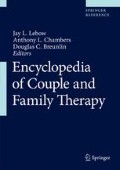Name
Betty Carter
Elizabeth A. (Golden) “Betty” Carter (1929–2012)
Introduction
Betty Carter, MSW, was originally trained as a Bowenian Family Therapist and became well known for her work on the expanded family life cycle. In collaboration with Monica McGoldrick, Carter integrated the concepts of individual human development and the traditional family life cycle to develop an expanded perspective of family development. In addition to the expanded family life cycle, Carter strongly influenced the field of marriage and family therapy by questioning the family systems theory tenets of traditional gender roles, power dynamics, and the narrow view of the female perspective. Carter was also a cofounder of the Women’s Project in Family Therapy, which aimed to amplify the female voice within the field of family therapy.
Career
Carter received her undergraduate degree from St. John’s College, NY, and went on to earn her Master of Social Work degree from Hunter College, NY. Carter then met Peggy Papp and Olga Silverstein while attending the Ackerman Institute for the Family, NY, who worked with Marianne Walters to lead the Women’s Project in Family Therapy. Carter eventually became the director and founder of the Family Institute of Westchester in White Plains, NY.
Contributions to Profession
Carter contributed to many writings and trainings that challenged concepts within the field of family therapy using a feminist lens. Notably, Carter worked with McGoldrick to coauthor The Family Life Cycle: A Framework for Family Therapy (1981). Carter continued to collaborate with McGoldrick on works that utilized the feminist critique to reevaluate traditional gender roles and power dynamics that are inherent within the Bowenian concepts of triangles in divorce and remarriage. The pair also examined the struggle between vertical (flow of generational anxiety) and horizontal (familial stress associated with different stages of the life cycle) patterns of convergence. Carter wrote Love, Honor, and Negotiate: Building Partnerships That Last a Lifetime (1996), which focuses on the function of money and power in relationships. Couples are encouraged to explore communication on cultural, social, and historical contexts associated with gender power dynamics that influence their relationship. Carter’s body of work has brought attention to family assessment through a multi-contextual lens including acknowledgment of class, race, ethnicity, gender, and sexual orientation.
Carter cofounded the Women’s Project in Family Therapy with Marianne Walters, Peggy Papp, and Olga Silverstein to examine the female experience within the family. The project aimed to challenge the idea that men and women share equality in a world where societal roles and rules are organized in favor of men at the disadvantage of women. The Women’s Project hosted a series of international meetings of female therapists to address traditional patriarchal views of gender in families and within the field of family therapy as a whole. As a product of these meetings, Carter and the other founding members of the Women’s Project went on to coauthor The Invisible Web: Gender Patterns in Family Relationships (1988). The aim of The Invisible Web was to challenge traditional gender beliefs and clinical practices in the field of family therapy. The writings further incorporated feminist thinking to explore conflicting sexist messages inherent within systems thinking.
Lastly, Carter was the director and founder of the Family Institute of Westchester where she was a clinical supervisor and taught students about family systems concepts while coaching clients to create change within their families. Carter is quoted as saying:
I would say that, after having been in the field for almost 30 years, of all of the many different things that I did, my most gratifying work was related to gender and culture – especially when we first started recognizing and working with gender issues. It was mind-blowing to me that we hadn’t noticed the most basic of things – the organizing principle of gender. And when I did notice it, nothing was the same.
References
Carter, B., & McGoldrick, M. (1981). The family life cycle: A framework for family therapy. New York: Gardner Press.
Carter, B., & Peters, J. K. (1996). Love, honor and negotiate: Building partnerships that last a lifetime. New York: Pocket Books.
McGoldrick, M. (2013). The multicultural family institute remembers Betty Carter (May 13, 1929–September 11, 2012). Journal of Marital and Family Therapy, 39(1), 2–4. https://doi.org/10.1111/jmft.12009.
Walters, M., Carter, B., Papp, P., & Silverstein, O. (1988). The invisible web: Gender patterns in family relationships. New York: The Guilford Press.
Author information
Authors and Affiliations
Corresponding author
Editor information
Editors and Affiliations
Section Editor information
Rights and permissions
Copyright information
© 2019 Springer Nature Switzerland AG
About this entry
Cite this entry
MacDonald, M., Parker, M.L. (2019). Carter, Betty. In: Lebow, J.L., Chambers, A.L., Breunlin, D.C. (eds) Encyclopedia of Couple and Family Therapy. Springer, Cham. https://doi.org/10.1007/978-3-319-49425-8_691
Download citation
DOI: https://doi.org/10.1007/978-3-319-49425-8_691
Published:
Publisher Name: Springer, Cham
Print ISBN: 978-3-319-49423-4
Online ISBN: 978-3-319-49425-8
eBook Packages: Behavioral Science and PsychologyReference Module Humanities and Social SciencesReference Module Business, Economics and Social Sciences

